Well, I don’t know if you asked for it, but you’re getting it just the same: my Top 10 Best Films of 2018. Now if you don’t see a film on here understand it’s probably because I haven’t seen it. Or it could be I genuinely thought it wasn’t top 10 worthy.
Whatever the case may be it’s important that you understand the absence of your favorite movie of the year from my list in no way diminishes the beauty or greatness of the film. Films are art. As such, it is a subjective experience. I often talk about how art does not exist in a vacuum – and that goes double for the people experiencing the art.
You might be asking yourself, what is a great film, Mr. Sherman? To be frank my bar for greatness isn’t as high as I think some of yours might be. Long ago I read a quote from the director Howard Hawks, “A great movie is a movie with three great scenes and no bad ones.” As with any rule or law of physics, it is not infallible. It is however about as good and just a metric for judging these types of things as I’ve ever found.
Top Ten lists are fun as they help us order our thoughts and opinions. They are a nice way of looking over the past year and reminding ourselves it really was a pretty good year at the movies after all. However, there is nothing stopping you from making your own top 10. In fact, if you want, you’re more than welcome to put your own top 10 in the comments section below.
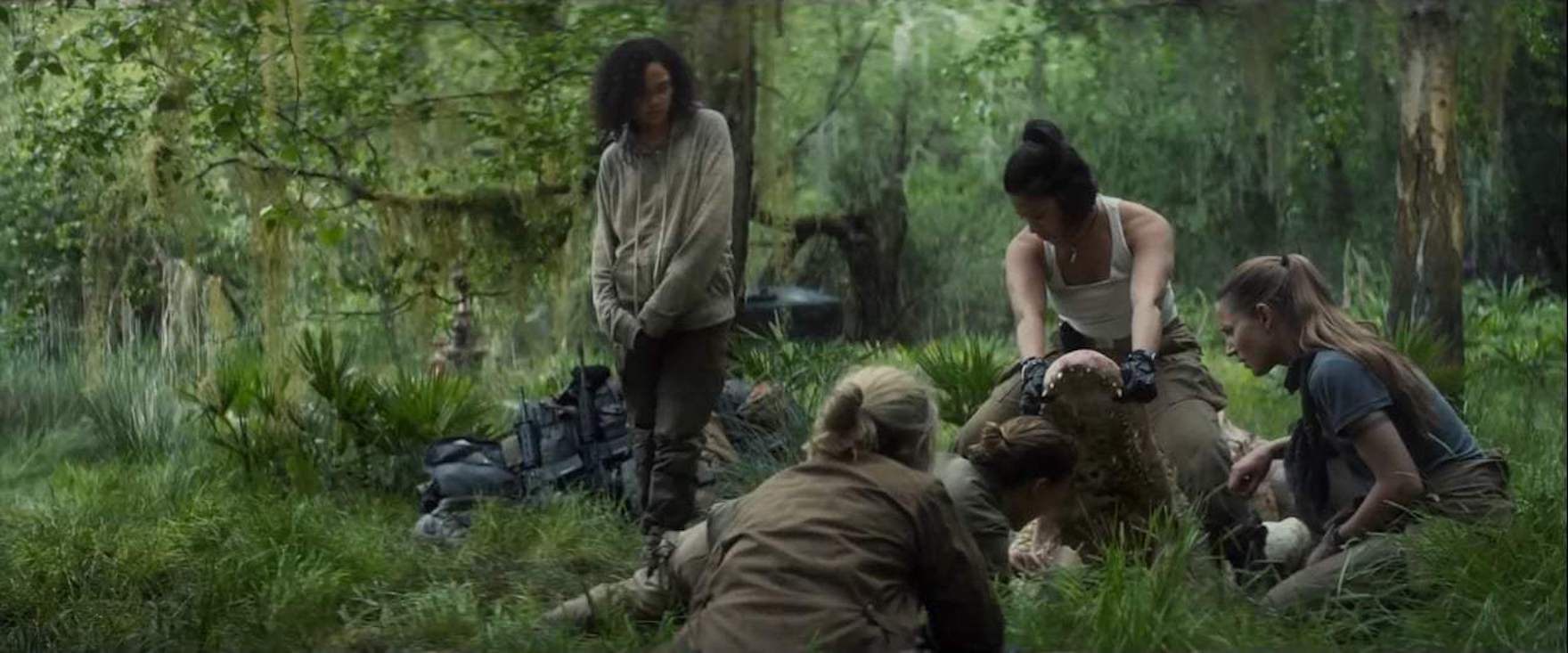
10. Annihilation – Dir. Alex Garland
Few movies haunted my psyche this year quite like Alex Garland’s Annihilation. Lush and meditative it was a science fiction crossed with a psychological thriller. Above all else, it was utterly unconcerned with solving the riddle of the plot. The glue was a talented cast including Natalie Portman, Gina Rodriguez, Tessa Thompson, Oscar Issac, and Jennifer Jason Leigh.
Studios are often lambasted for unleashing what is considered pandering fare onto mass audiences. But with Annihilation, Garland delivered a metaphorically dense and blunt treatise on trauma and grief. Geoff Barrow and Ben Salisbury infuse the film with a hypnotic score which serves as one of the many underpinnings of the film. Shot by Rob Hardy, Annihilation is a dreamlike, sometimes nightmarish, exploration of how we carry the pain of our lives with us and how it can transform us; for good or bad.

9. Sorry To Bother You – Dir. Boots Riley
Boots Riley’s directorial debut is far from perfect. It has a lot on its mind and tries to unburden the whole of it without parsing between what is best implied and what is best stated. But it’s hard to deny the breathtaking verve and sheer audacity of the film’s very existence and style from frame to frame. Far from being pastiche, Riley has something to say, and he wants us to listen. Sorry to Bother You is abrasive, fun, and gripping; with each frame filled with brazen confidence normally reserved for seasoned directors.
To say nothing of a third act twist that either had you applauding or throwing up your hands in exasperation. Most directors would have likely rewritten the last act for fear of alienating the audience. Sorry To Bother You is nothing less than a calling card for a brand new voice in American cinema.

8. A Simple Favor – Dir. Paul Feig
A hallmark of a great movie is its ability to make you see an actor in a brand new light. Paul Feig’s A Simple Favor showed us how badly we had misjudged and misused Blake Lively. Feig gives Lively one of the most iconic entrances of the year. It helped that Lively imbued her Emily with a wicked sense of perversity and dark humor that had us ignoring our morals and rooting for her to succeed.
Feig himself achieved a new personal best. A Simple Favor is Feig at his most calculated and stylized. Working from a pitch-perfect and razor-sharp script by Jessica Sharzer, the duo delivered a sumptuous dark camp thriller. Movies are often described in review blurbs as “wicked,” but with A Simple Favor, we have a movie that finally lives up to the adjective.
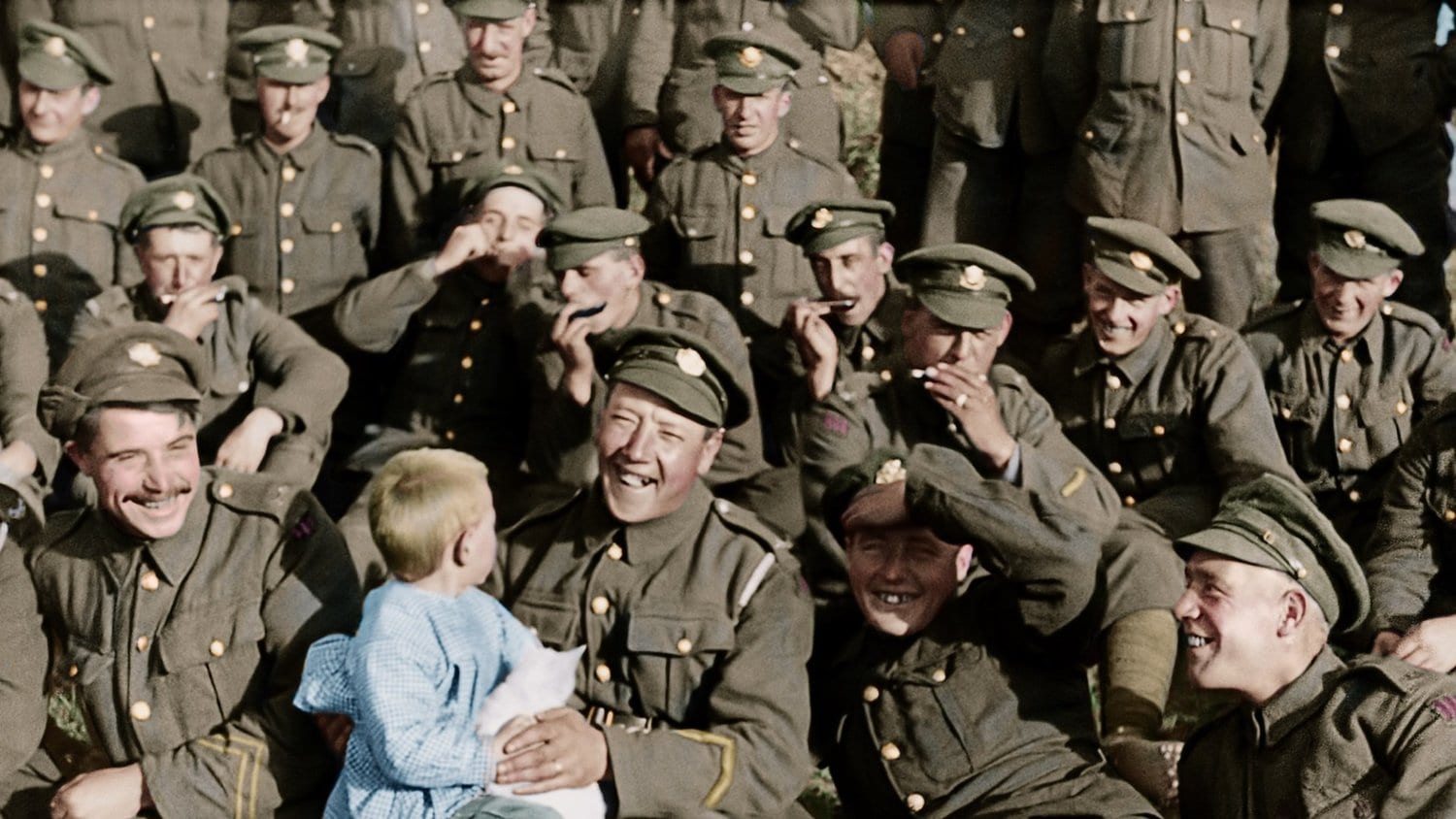
7. They Shall Not Grow Old – Dir. Peter Jackson
Documentaries come in many forms. Some are straight forward while others are more esoteric and abstract. But few were as immersive and humanistic as Peter Jackson’s World War I documentary They Shall Not Grow Old. Combing through countless hours of archival footage and audio, while also utilizing the editing tools at his disposal, Jackson gave us not a documentary so much as a testament.
They Shall Not Grow Old looks at the lives of the soldiers who fought and died during the war. Jackson does away with a narrator and instead lets the soldiers themselves tell the story. Choosing to look at the war overall and eschewing specific battles and dates, he achieves a sort of transcendental state of looking at history. It is an attempt to better understand the horrors of war without attempting to glorify or criticize it. Oddly, by being so subjective about the whole thing, Jackson achieves a sense of objectiveness as he allows us to decide what to glean from it all.
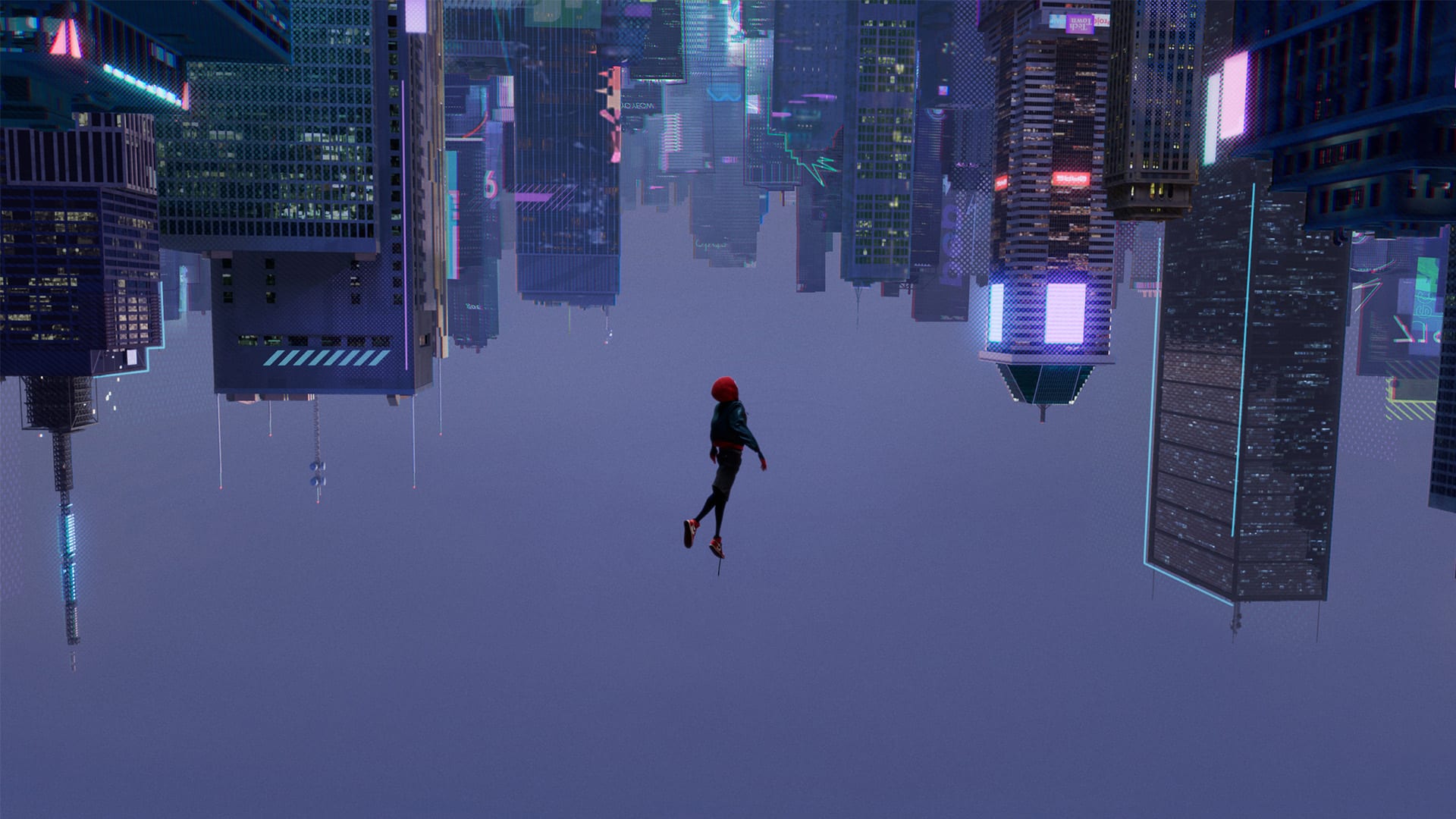
6. Spider-Man: Into the Spider-Verse – Dir. Peter Ramsey, Robert Perishetti Jr., and Rodney Rothman
Peter Ramsey, Robert Perishetti Jr., and Rodney Rothman set out to make a good Spider-Man movie and wound up making one of the best movies of the year. Not since Logan has a comic book movie so heedlessly and excitingly cast off the shackles of the genre. Into the Spider-Verse reminds us that deconstructing a character doesn’t have to be pessimistic or dour. In fact, being critical of something is often a labor of love and admiration for a thing.
The animation style is as brash and inventive as the story within the movie itself. Comics have long since played with alternate realities and goofy twists and turns. Until now their cinematic cousins have largely been shy about this genre quirk. Phil Lord and Rodney Rotham’s script looks at self-doubt, anxiety, feelings of isolation, and collectivism all while maintaining a sly wit and joyous notion of heroism. We live in a time where we feel more isolated from each other than ever before. Into the Spider-Verse reminded us that, unlike the other superhero movies, the possibilities for change and hope comes from us, not from them.

5. Support The Girls – Dir. Andrew Bujalski
Americans have long placed a premium on hard work and loyalty to the company. But rarely do modern movies ever look at the workplace with any real scrutiny or ethical interrogation. Set in a Hooters-style restaurant Support the Girls looks at a novel idea; a manager who truly cares about her employees. Not only is this an alien concept to us but it also shows the world of difference it can make.
Regina Hall’s Lisa struggles to maintain a semblance of sanity as she struggles to balance work and life. She fights for her employees, defends their work ethics, and tries to understand their lives and choices. By the end, she is forced to discover that they may feel like a family they are not. Though she may be the boss, she can not mother them outside of work. Support the Girls has one of my favorite last shots of the year. Lisa, Maci (Haley Lu Richardson), and Danyelle (Shayna McHayle) stand on a rooftop, as equals. Together they try and figure out their future. Moving and cathartic the scene is emblematic of the film’s quiet power.
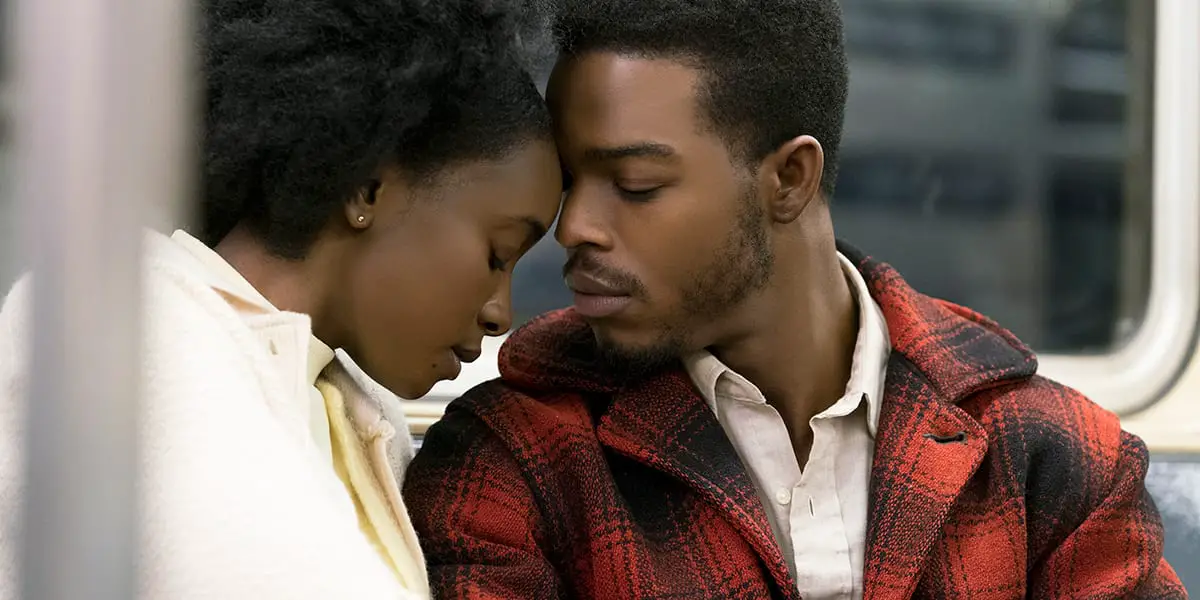
4. If Beale Street Could Talk – Dir. Barry Jenkins
Barry Jenkins’ movies are akin to cinematic alchemy. If Beale Street Could Talk is a love story in which we can feel the love radiating off the screen as it washes over us like a tsunami. Jenkins imbues his stories with such empathy that we understand and feel where all the characters are coming from. Perhaps it is why Brian Tyree Henry’s monologue about how “This country hate’s n*****,” is so powerful.
It is stripped of any sort of message and instead focuses on the life of Henry’s character, through the lens of both the intimate and historical. Adapted from a book by James Baldwin, Jenkins deftly showcases the author’s compassion and intellect in such a simple and straight forward way as to command attention. The structure of the film is close to lyrical poetry. Less a three-act structure it instead seems to flow like a river of memory as Tish (Kiki Layne) recounts her life with Fonny (Stephan James). The tragic love story encompasses race, class, religion, and above all else, love. Love is the overriding and pulsating throughline of the film. Many movies are about love though, few of them, however, make you feel it quite as intensely and thoroughly as If Beale Street Could Talk.
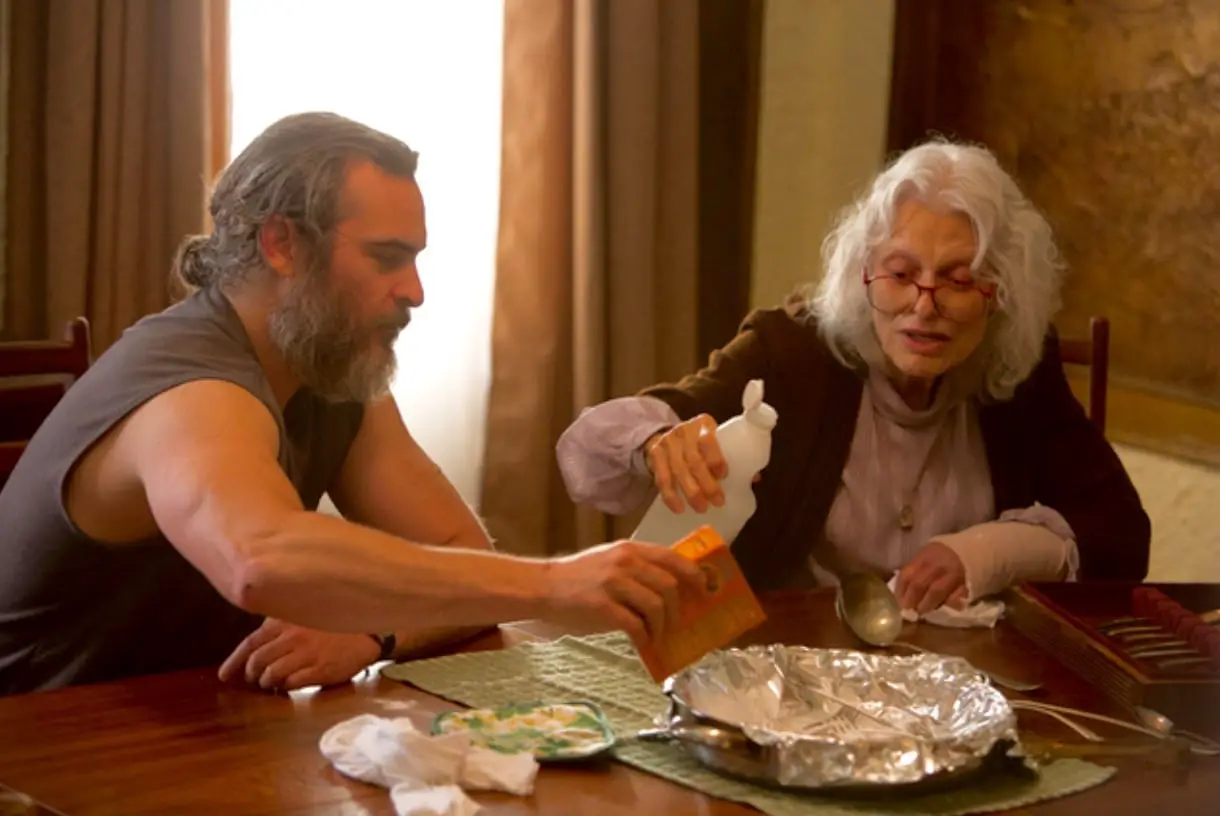
3. You Were Never Really Here – Dir. Lynne Ramsay
Lynne Ramsay might have made one of the few noirs with a somewhat happy ending. Make no mistake it is still a dark and moody film. Joe (Joaquin Phoenix) is a veteran who suffers PTSD both from being a soldier and a child in an abusive home. The effectiveness of You Were Never Really Here comes from both Ramsay’s adherence to the genre’s tropes and her subversion of them.
Phoenix can do silent, reticent, and tortured in his sleep. But with Ramsay’s script, adapted from the book of the same name by Jonathan Ames, he is pushed to something more. Watching scenes of Joe just sitting, talking, and laughing with his mother, played by Judith Roberts, was like seeing a whole new actor. Joe is an emotionally fragile man who uses his ability to withstand violence and inflict it, to save little girls from suffering the same fate. As usual with stories like these, it’s the latest case that will bring him to the brink of self-destruction. But what Ramsay shows is that going to the brink is fine. But by pulling back from the brink is at once hopeful and yet more devastating.
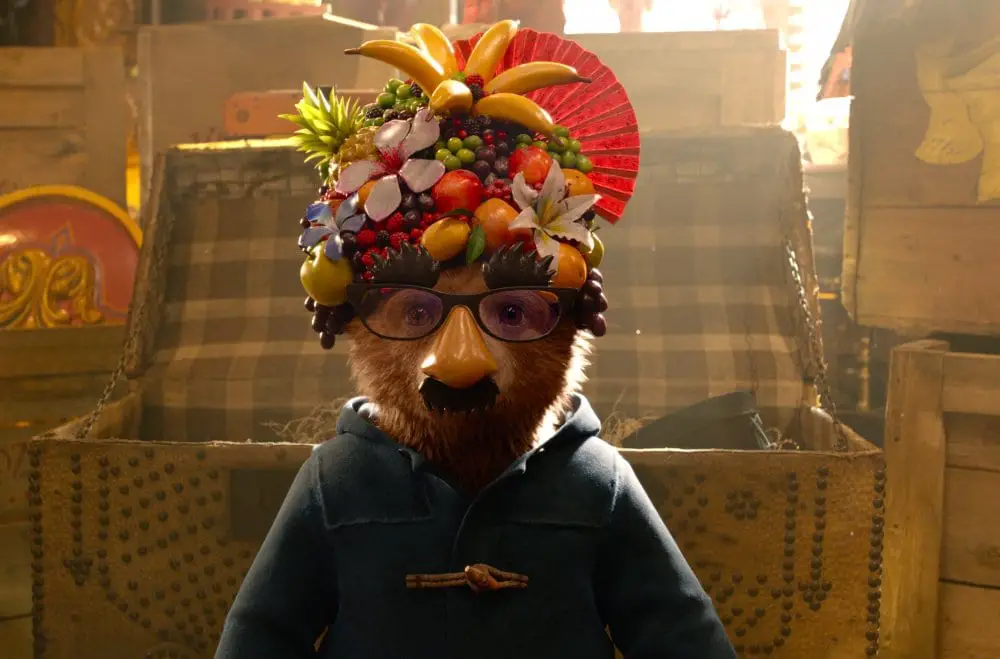
2. Paddington 2 – Dir. Paul King
Few films were as endearing and visually delightful as Paddington 2. Paul King’s children’s tale is somehow more ingenious, streamlined, and charming than the original Paddington. Underneath the cute silliness is a daring precept Mister Rogers would love, as well as a sly commentary on the culture that gave us Brexit.
I’ve seen Paddington 2 probably more times than almost any other film on this list. Each time I watch it I am astounded by how every shot seems alive with joy and whimsy. Nevermind that King and his cinematographer, Erik Wilson, have more faith in the child’s eye to take in visual cues and information. Paddington 2 brims with imagination and joy as Paddington (voiced by Ben Wishaw) gets framed for stealing, goes to jail, escapes, and has a breathtaking scene atop a runaway train car. Heck, children’s film or not, it has such a bone-deep understanding of cinematic language and hedonistic joy I was left with a sort of drunken smile at the end. Few films are as beautiful inside and out, as Paddington 2.
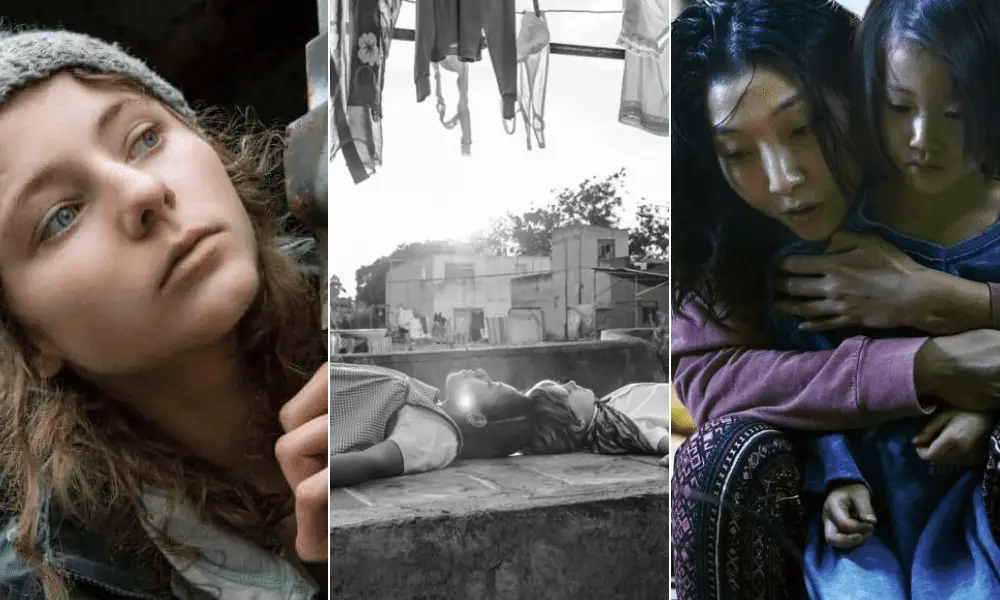
1. Roma – Dir. Alfonso Cuaron/Shoplifters – Dir. Hirokazu Kore-eda/Leave No Trace – Dir. Debra Granick
The best movie of the year just so happened to be three. While each of them is unique in their own style and substance, all three have masterful control of story and technique. Oh, and they each hum with encompassing love and understanding of their characters.
Shoplifters is a tale filled with characters straight out of a Charles Dickens novel. The latest from Hirokazu Kore-eda tells the story of a strange family of petty thieves as they struggle to eke out a meager existence. Kore-eda sets his movie in the slums of Tokyo, showing us a side of the infamous city little explored by most filmmakers.
Kore-eda challenges societal notions of what makes a family. In so doing, he peels back the surface layers of these seemingly shallow characters to reveal a great love and desire for belonging bellowing within them. A quiet and subtle film, it unfolds itself gently before our eyes with a slow and easy pace. By the end, we are overcome with emotion, as love and what is “right” come crashing together in a tragic but gentle conclusion.
Alfonso Cuaron’s Roma is nothing less than a masterpiece. Cuaron wrote, directed, shot, and co-edited this black and white ode to the maid who raised him. Yalitza Aparicio is resplendent as Cleo, our heroine. Aware of the pitfalls of his endeavor he spotlights the differences in class in Mexico as well as highlighting how skin tone can hinder or help class perception.
All of this is done while Cuaron tells a sweeping intimate epic of one woman’s life. She doesn’t save the world, and she doesn’t quit and find a better life. Rarely has working-class life been so harshly and accurately detailed onscreen. The scene where Cleo, stops doing laundry and lays down next to one of the children, who is playing dead, is a prime example of Cuaron’s brutal honesty. Laying down, overcome with calm and serenity, she utters, “I like being dead.” Aparicio’s presence and performance seem to be a near perfect vessel for Cuaron’s purposes. Roma is a poetic documentary as it achingly recreates a time and place in Cuaron’s memories. The immediacy of Cuaron’s camera and the expressive dexterity of Aparicio’s face left me speechless. Roma is a work of staggering humanity and artistic achievement.
Leave No Trace is the one American film deserving to be considered on the same level as Shoplifters and Roma. Debra Granik’s tale is on the surface not complicated. A father, Will (Ben Foster) and his daughter Tom (Thomasin McKenzie) live off the gird until park rangers discover them. What follows is Tom’s realization that her father’s way of life might not be for her. Granik trusts her actors, and us, enough to allow everything to unfold without intruding bombastic scores and flashy camera shots.
The two travel across the country in an attempt to find peace of mind and a place they can call home. McKenzie is a revelation as Tom, a girl who begins to doubt her father while also realizing he may need more help than she or anyone can give him. Foster is infamous for playing troubled characters, but here Granik imbues him with a gentle sadness not normally afforded his other roles. The exchange between the two as Tom confesses to her father “The same thing that’s wrong with you isn’t wrong with me,” is heartbreaking. But it becomes all the more so when Will tells her “I know.”
All three of these movies have a sadness to them, true. The sadness comes from hard choices the characters must face about themselves and how they wish to live. But in the end, a sort of melancholic beauty shines from within. They have such a swelling love for people and their flawed existence. Shoplifters, Roma, and Leave No Trace are my number one picks not just because of technical mastery. They are my number one pick because after watching all three of them, my heart was full.

